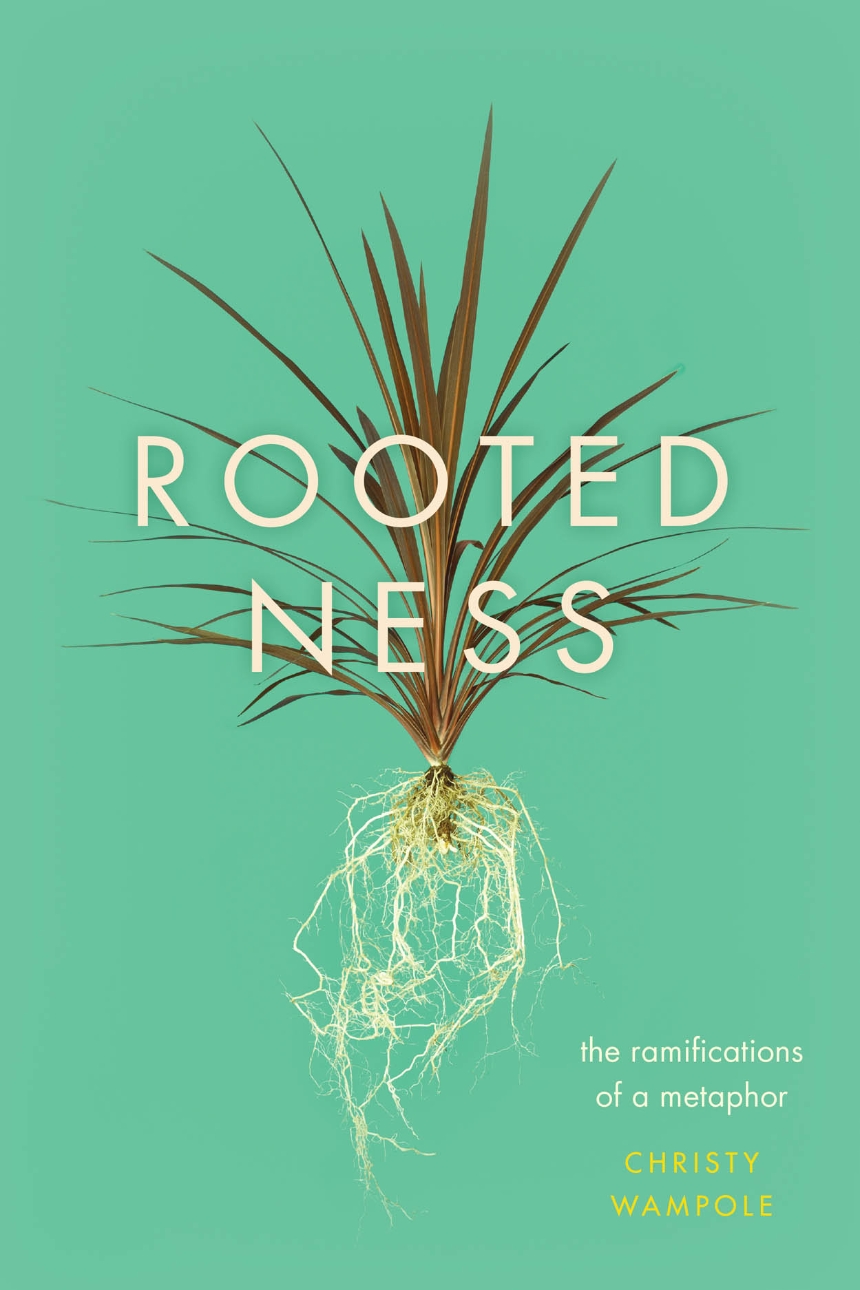Rootedness
The Ramifications of a Metaphor
People have long imagined themselves as rooted creatures, bound to the earth—and nations—from which they came. In Rootedness, Christy Wampole looks toward philosophy, ecology, literature, history, and politics to demonstrate how the metaphor of the root—surfacing often in an unexpected variety of places, from the family tree to folk etymology to the language of exile—developed in twentieth-century Europe.
Wampole examines both the philosophical implications of this metaphor and its political evolution. From the root as home to the root as genealogical origin to the root as the past itself, rootedness has survived in part through its ability to subsume other compelling metaphors, such as the foundation, the source, and the seed. With a focus on this concept’s history in France and Germany, Wampole traces its influence in diverse areas such as the search for the mystical origins of words, land worship, and nationalist rhetoric, including the disturbing portrayal of the Jews as an unrooted, and thus unrighteous, people. Exploring the works of Martin Heidegger, Simone Weil, Jean-Paul Sartre, Paul Celan, and many more, Rootedness is a groundbreaking study of a figure of speech that has had wide-reaching—and at times dire—political and social consequences.
Wampole examines both the philosophical implications of this metaphor and its political evolution. From the root as home to the root as genealogical origin to the root as the past itself, rootedness has survived in part through its ability to subsume other compelling metaphors, such as the foundation, the source, and the seed. With a focus on this concept’s history in France and Germany, Wampole traces its influence in diverse areas such as the search for the mystical origins of words, land worship, and nationalist rhetoric, including the disturbing portrayal of the Jews as an unrooted, and thus unrighteous, people. Exploring the works of Martin Heidegger, Simone Weil, Jean-Paul Sartre, Paul Celan, and many more, Rootedness is a groundbreaking study of a figure of speech that has had wide-reaching—and at times dire—political and social consequences.
288 pages | 6 x 9 | © 2016
Culture Studies:
Geography: Cultural and Historical Geography
History: European History
Literature and Literary Criticism: Romance Languages
Philosophy: Philosophy of Society
Reviews
Table of Contents
Acknowledgments
Introduction
1 Welcome to the Rhizosphere
Some Thoughts on Metaphor
Generation Radix
Home Is Where the Root Is
Jung and Bachelard Go Deep: The Root as Subconscious Image
Radical Evil: Of Mandrakes and Wurzelmännchen
2 Radical Poetry
Ponge and the Plant’s Immobility
Into Thin Air: Celan’s “Radix, Matrix”
Guillevic’s Radical Trying
The Awkward Human: Levertov and Ecological Alienation
3 Roots and Transcendence
Verticality and the Root
Claudel’s Rooted Crucifix
Valéry and the Vegetal Brain
Inversion and Conversion
Monsieur Teste, Botanical Thinker
Tournier and the Upending of Western Culture
4 Saving Europe from Itself: Weil’s Enracinement and Heidegger’s Bodenständigkeit
Talk of Roots in the Air: La querelle du peuplier
Weil’s Fear of Abstraction
Heidegger the Terroiriste
5 Sartre, Phenomenology, and the Root
The Nausea-Inducing Root of Being
Sartre’s Autobiographical Tree
Phenomenology’s Search for Ground
6 Etymology and Essence: The Primeval Power of Word Roots
The Etymological Obsession
German Ideological Etymology
Paulhan’s Etymological Skepticism
Derrida’s Deracination of Language
Blanchot and the Etymon’s Danger
7 From Rhizome to Vegetal Democracy
The Cryptic Rhizome of Deleuze and Guattari
The Postmodern Plantation
Neo-Paganism and Plant Democracy
Bibliography
Index
Introduction
1 Welcome to the Rhizosphere
Some Thoughts on Metaphor
Generation Radix
Home Is Where the Root Is
Jung and Bachelard Go Deep: The Root as Subconscious Image
Radical Evil: Of Mandrakes and Wurzelmännchen
2 Radical Poetry
Ponge and the Plant’s Immobility
Into Thin Air: Celan’s “Radix, Matrix”
Guillevic’s Radical Trying
The Awkward Human: Levertov and Ecological Alienation
3 Roots and Transcendence
Verticality and the Root
Claudel’s Rooted Crucifix
Valéry and the Vegetal Brain
Inversion and Conversion
Monsieur Teste, Botanical Thinker
Tournier and the Upending of Western Culture
4 Saving Europe from Itself: Weil’s Enracinement and Heidegger’s Bodenständigkeit
Talk of Roots in the Air: La querelle du peuplier
Weil’s Fear of Abstraction
Heidegger the Terroiriste
5 Sartre, Phenomenology, and the Root
The Nausea-Inducing Root of Being
Sartre’s Autobiographical Tree
Phenomenology’s Search for Ground
6 Etymology and Essence: The Primeval Power of Word Roots
The Etymological Obsession
German Ideological Etymology
Paulhan’s Etymological Skepticism
Derrida’s Deracination of Language
Blanchot and the Etymon’s Danger
7 From Rhizome to Vegetal Democracy
The Cryptic Rhizome of Deleuze and Guattari
The Postmodern Plantation
Neo-Paganism and Plant Democracy
Bibliography
Index
